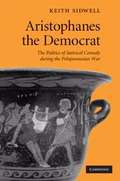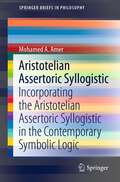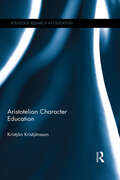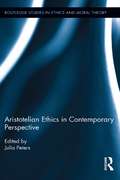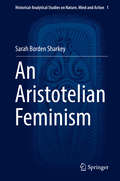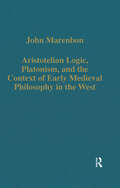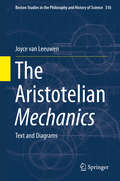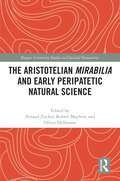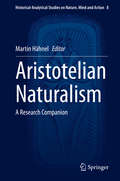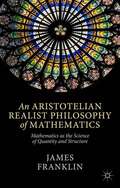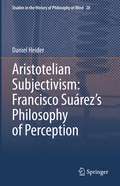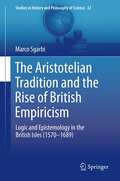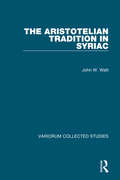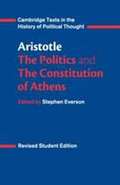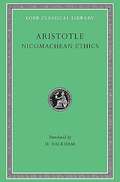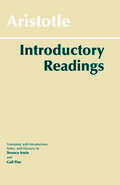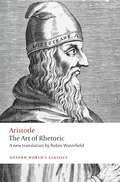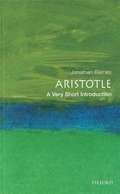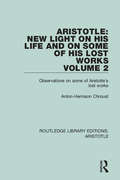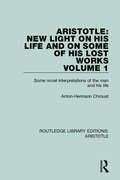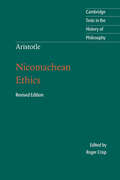- Table View
- List View
Aristophanes the Democrat: The Politics of Satirical Comedy During the Peloponnesian War
by Keith SidwellThis book provides a new interpretation of the nature of Old Comedy and its place at the heart of Athenian democratic politics. Professor Sidwell argues that Aristophanes and his rivals belonged to opposing political groups, each with their own political agenda. Through disguised caricature and parody of their rivals' work, the poets expressed and fuelled the political conflict between their factions. Professor Sidwell rereads the principal texts of Aristophanes and the fragmented remains of the work of his rivals in the light of these arguments for the political foundations of the genre.
Aristophanes' Thesmophoriazusae
by Ashley ClementsAristophanes' comic masterpiece Thesmophoriazusae has long been recognized amongst the plays of Old Comedy for its deconstruction of tragic theatricality. This book reveals that this deconstruction is grounded not simply in Aristophanes' wider engagement with tragic realism. Rather, it demonstrates that from its outset Aristophanes' play draws upon Parmenides' philosophical revelations concerning reality and illusion, employing Eleatic strictures and imagery to philosophize the theatrical situation, criticize Aristophanes' poetic rival Euripides as promulgator of harmful deceptions, expose the dangerous complicity of Athenian theatre audiences in tragic illusion, and articulate political advice to an audience negotiating a period of political turmoil characterized by deception and uncertainty (the months before the oligarchic coup of 411 BC). The book thereby restores Thesmophoriazusae to its proper status as a philosophical comedy and reveals hitherto unrecognized evidence of Aristophanes' political use of Eleatic ideas during the late fifth century BC.
Aristotelian Assertoric Syllogistic: Incorporating the Aristotelian Assertoric Syllogistic in the Contemporary Symbolic Logic (SpringerBriefs in Philosophy)
by Mohamed A. AmerThis book is a treatise on Aristotelian assertoric syllogistic, which is currently of growing interest. Some centuries ago, it attracted the attention of the founders of modern logic, who approached it in several (semantical and syntactical) ways. Further approaches were introduced later on. In this book these approaches (with few exceptions) are discussed, developed and interrelated. Among other things, different facets of soundness, completeness, decidability, and independence for Aristotelian assertoric syllogistic are investigated. Specifically arithmetization (Leibniz), algebraization (Leibniz and Boole), and Venn models (Euler and Venn) are examined. The book is aimed at scholars in the fields of logic and history of logic.
Aristotelian Character Education (Routledge Research in Education)
by Kristján KristjánssonThis book provides a reconstruction of Aristotelian character education, shedding new light on what moral character really is, and how it can be highlighted, measured, nurtured and taught in current schooling. Arguing that many recent approaches to character education understand character in exclusively amoral, instrumentalist terms, Kristjánsson proposes a coherent, plausible and up-to-date concept, retaining the overall structure of Aristotelian character education.After discussing and debunking popular myths about Aristotelian character education, subsequent chapters focus on the practical ramifications and methodologies of character education. These include measuring virtue and morality, asking whether Aristotelian character education can salvage the effects of bad upbringing, and considering implications for teacher training and classroom practice. The book rejuvenates time-honoured principles of the development of virtues in young people, at a time when ‘character’ features prominently in educational agendas and parental concerns over school education systems.Offering an interdisciplinary perspective which draws from the disciplines of education, psychology, philosophy and sociology, this book will appeal to researchers, academics and students wanting a greater insight into character education.
Aristotelian Ethics in Contemporary Perspective (Routledge Studies in Ethics and Moral Theory)
by Julia PetersBy bringing together influential critics of neo-Aristotelian virtue ethics and some of the strongest defenders of an Aristotelian approach, this collection provides a fresh assessment of the strengths and weaknesses of Aristotelian virtue ethics and its contemporary interpretations. Contributors critically discuss and re-assess the neo-Aristotelian paradigm which has been predominant in the philosophical discourse on virtue for the past 30 years.
An Aristotelian Feminism (Historical-Analytical Studies on Nature, Mind and Action #1)
by Sarah Borden SharkeyThis book articulates the theoretical outlines of a feminism developed from Aristotle's metaphysics, making a new contribution to feminist theory. Readers will discover why Aristotle was not a feminist and how he might have become one, through an investigation of Aristotle and Aristotelian tradition. The author shows how Aristotle's metaphysics can be used to articulate a particularly subtle and theoretically powerful understanding of gender that may offer a highly useful tool for distinctively feminist arguments. This work builds on Martha Nussbaum's 'capabilities approach' in a more explicitly and thoroughly hylomorphist way. The author shows how Aristotle's hylomorphic model, developed to run between the extremes of Platonic dualism and Democritean atomism, can similarly be used today to articulate a view of gender that takes bodily differences seriously without reducing gender to biological determinations. Although written for theorists, this scholarly yet accessible book can be used to address more practical issues and the final chapter explores women in universities as one example. This book will appeal to both feminists with limited familiarity with Aristotle's philosophy, and scholars of Aristotle with limited familiarity with feminism.
Aristotelian Logic, Platonism, and the Context of Early Medieval Philosophy in the West (Variorum Collected Studies)
by John MarenbonPhilosophy in the medieval Latin West before 1200 is often thought to have been dominated by Platonism. The articles in this volume question this view, by cataloguing, describing and investigating the tradition of Aristotelian logic in the period, examining its influence on authors usually placed within the Platonic tradition (Eriugena, Anselm, Gilbert of Poitiers), and also looking at some of the characteristics of early medieval Platonism. Abelard, the most brilliant logician of the age, is the main subject of three articles, and the book concludes with two more general discussions about how and why medieval philosophy should be studied.
The Aristotelian Mechanics
by Joyce Van LeeuwenThisbook examines the transmission processes of the Aristotelian Mechanics. It does so to enable readers to appreciate thevalue of the treatise based on solid knowledge of the principles of the text. In addition, the book's critical examination helps clear up many of the currentmisunderstandings about the transmission of the text and the diagrams. The first part of the book sets out the Greek manuscript tradition of the Mechanics, resulting in a newlyestablished stemma codicum that illustrates the affiliations of themanuscripts. This research has led to new insights into the transmission of thetreatise, most importantly, it also demonstrates an urgent need for a new text. A first critical edition of the diagrams contained in the Greek manuscripts ofthe treatise is also presented. These diagrams are not only significant for areconstruction of the text but can also be considered as a commentary on thetext. Diagrams are thus revealed to be a powerful tool in studying processes ofthe transfer and transformation of knowledge. This becomes especially relevantwhen the manuscript diagrams are compared with those in the printed editionsand in commentaries from the early modern period. The final part of the bookshows that these early modern diagrams and images reflect the altered scope ofthe mechanical discipline in the sixteenth century.
The Aristotelian Mirabilia and Early Peripatetic Natural Science (Rutgers University Studies in Classical Humanities)
by Arnaud ZuckerThis is the first volume devoted to the sections of the Aristotelian Mirabilia on natural science, filling a significant gap in the history of the Aristotelian study of nature and especially of animals. The chapters in this volume explore the Mirabilia, or De mirabilibus auscultationibus (On Marvelous Things Heard), and its engagement with the natural sciences. The first two chapters deliver an introduction to this work: one a discussion of the history of the text; the other a discussion of Aristotelian epistemology and methodology, and the role of the Mirabilia in that context. This is followed by eight chapters that, together, are effectively a commentary on those sections of the Mirabilia with close connections to Aristotle’s Historia animalium and to a number of Theophrastus’ scientific treatises. Finally, the volume ends with two chapters on thematic topics connected to natural science running throughout the work, namely color and disease. The Aristotelian Mirabilia and Early Peripatetic Natural Science should prove invaluable to scholars and students interested in the ancient Greek study of nature, ancient philosophy, and Aristotelian science in particular.
Aristotelian Naturalism
by Martin HähnelThis book features many of the leading voices championing the revival of Neo-Aristotelian Ethical Naturalism (AN) in contemporary philosophy. It addresses the whole range of issues facing this research program at present. Coverage in the collection identifies differentiations, details standpoints, and points out new perspectives. This volume answers a need: AN is quite new to contemporary philosophy, despite its deep roots in the history of philosophy. As yet, there are many unanswered questions regarding its relation to contemporary views in metaethics. It is certainly not equivalent to dominant naturalistic approaches to metaethics in Anglophone philosophy. Indeed, it is not obviously incompatible with some approaches identified as nonnaturalistic. Further, there are controversies regarding the views of the first wave of virtue revivalists. The work of G.E.M. Anscombe and Philippa Foot is frequently misunderstood, despite the fact that they are important figures in the contemporary revival. This volume details a robust approach to ethics by situating it within the context of human life. It will help readers to better understand how AN raises deep questions about the relation of action and its evaluation to human nature. Neo-Aristotelians argue that something like the traditional cardinal virtues, practical wisdom, temperance, justice and courage, are qualities that perfect human reason and desire.
Aristotelian Naturalism: A Research Companion (Historical-Analytical Studies on Nature, Mind and Action #8)
by Martin HähnelThis book features many of the leading voices championing the revival of Neo-Aristotelian Ethical Naturalism (AN) in contemporary philosophy. It addresses the whole range of issues facing this research program at present. Coverage in the collection identifies differentiations, details standpoints, and points out new perspectives. This volume answers a need: AN is quite new to contemporary philosophy, despite its deep roots in the history of philosophy. As yet, there are many unanswered questions regarding its relation to contemporary views in metaethics. It is certainly not equivalent to dominant naturalistic approaches to metaethics in Anglophone philosophy. Indeed, it is not obviously incompatible with some approaches identified as nonnaturalistic. Further, there are controversies regarding the views of the first wave of virtue revivalists. The work of G.E.M. Anscombe and Philippa Foot is frequently misunderstood, despite the fact that they are important figures in the contemporary revival. This volume details a robust approach to ethics by situating it within the context of human life. It will help readers to better understand how AN raises deep questions about the relation of action and its evaluation to human nature. Neo-Aristotelians argue that something like the traditional cardinal virtues, practical wisdom, temperance, justice and courage, are qualities that perfect human reason and desire.
An Aristotelian Realist Philosophy of Mathematics
by James FranklinMathematics is as much a science of the real world as biology is. It is the science of the world's quantitative aspects (such as ratio) and structural or patterned aspects (such as symmetry). The book develops a complete philosophy of mathematics that contrasts with the usual Platonist and nominalist options.
Aristotelian Subjectivism: Francisco Suárez’s Philosophy of Perception (Studies in the History of Philosophy of Mind #28)
by Daniel HeiderThis monograph presents new material on Francisco Suárez’s comprehensive theory of sense perception. The core theme is perceptual intentionality in Suárez’s theory of the senses, external and internal, as presented in his Commentaria una cum quaestionibus in libros Aristotelis De anima published in 1621. The author targets the question of the multistage genesis of perceptual acts by considering the ontological “items” involved in the procession of sensory information. However, the structural issue is not left aside, and the nature of the relationship due to which our perceptions are mental representations of this or that object is also considered. The heuristic historiographical background includes not only the theories of classical authors, such as Aristotle and Aquinas, but also those of late medieval authors of the fourteenth century. These are headed by John Duns Scotus, John of Jandun, Peter Auriol and Peter John Olivi. Readers will discover the differences between Suárez’s and Aquinas’s views, as well as other sources that may have served as positive inspiration for the Jesuit’s theory. By considering the late medieval philosophy of the fourteenth century, this book helps, to a certain extent, to fill a gap in the historiography of philosophy regarding the link between late medieval and early modern scholasticism. In the first part of the book, the metaphysics of the soul and powers is considered. Chapters on the external senses follow, covering topics such as the sensible species, the causes of sensation, self-awareness, and the ordering of the external senses. A further chapter is devoted to the internal senses and the author argues that by reducing the number and functional scope of the interior senses Suárez deepens the gap between the external senses and the intellect, but he reduces it through emphasizing the unifying efficacy of the soul.This book brings a synthetic and unifying perspective to contemporary research and will particularly appeal to graduate students and researchers in theology and philosophy, especially philosophy of mind.
The Aristotelian Tradition and the Rise of British Empiricism
by Marco SgarbiOffers an extremely bold, far-reaching, and unsuspected thesis in the history of philosophy: Aristotelianism was a dominant movement of the British philosophical landscape, especially in the field of logic, and it had a long survival. British Aristotelian doctrines were strongly empiricist in nature, both in the theory of knowledge and in scientific method; this character marked and influenced further developments in British philosophy at the end of the century, and eventually gave rise to what we now call British empiricism, which is represented by philosophers such as John Locke, George Berkeley and David Hume. Beyond the apparent and explicit criticism of the old Scholastic and Aristotelian philosophy, which has been very well recognized by the scholarship in the twentieth century and which has contributed to the false notion that early modern philosophy emerged as a reaction to Aristotelianism, the present research examines the continuity, the original developments and the impact of Aristotelian doctrines and terminology in logic and epistemology as the background for the rise of empiricism.Without the Aristotelian tradition, without its doctrines, and without its conceptual elaborations, British empiricism would never have been born. The book emphasizes that philosophy is not defined only by the 'great names', but also by minor authors, who determine the intellectual milieu from which the canonical names emerge. It considers every single published work of logic between the middle of the sixteenth and the end of the seventeenth century, being acquainted with a number of surviving manuscripts and being well-informed about the best existing scholarship in the field.
The Aristotelian Tradition in Syriac (Variorum Collected Studies)
by John W. WattThis volume presents a panorama of Syriac engagement with Aristotelian philosophy primarily situated in the 6th to the 9th centuries, but also ranging to the 13th. It offers a wide range of articles, opening with surveys on the most important philosophical writers of the period before providing detailed studies of two Syriac prolegomena to Aristotle’s Categories and examining the works of Hunayn, the most famous Arabic translator of the 9th century. Watt also examines the relationships between philosophy, rhetoric and political thought in the period, and explores the connection between earlier Syriac tradition and later Arabic philosophy in the thought of the 13th century Syriac polymath Bar Hebraeus. Collected together for the first time, these articles present an engaging and thorough history of Aristotelian philosophy during this period in the Near East, in Syriac and Arabic.
Aristotelianism in the First Century Bce
by Andrea FalconThis book is a full study of the remaining evidence for Xenarchus of Seleucia, one of the earliest interpreters of Aristotle. Andrea Falcon places the evidence in its context, the revival of interest in Aristotle's philosophy that took place in the first century BCE. Xenarchus is often presented as a rebel, challenging Aristotle and the Aristotelian tradition. Falcon argues that there is more to Xenarchus and his philosophical activity than an opposition to Aristotle; he was a creative philosopher, and his views are best understood as an attempt to revise and update Aristotle's philosophy. By looking at how Xenarchus negotiated different aspects of Aristotle's philosophy, this book highlights elements of rupture as well as strands of continuity within the Aristotelian tradition.
Aristotle: The Politics and the Constitution of Athens
by AristotleThis new collection of Aristotle's political writings aims to provide the student with all the necessary materials for a full understanding of his work as a political scientist. Translated by Stephen Everson,
Aristotle: Nicomachean Ethics (Second Edition) (Loeb Classical Library #XIX)
by H. Rackham AristotleNearly all the works Aristotle (384-322 BCE) prepared for publication are lost; the priceless ones extant are lecture-materials, notes, and memoranda (some are spurious). They can be categorized as practical; logical; physical; metaphysical; on art; other; fragments.
Aristotle: Introductory Readings
by Aristotle Terence Irwin Gail FineDrawn from the translations and editorial aids of Irwin and Fine's Aristotle, Selections (Hackett Publishing Co., 1995), this anthology will be most useful to instructors who must try to do justice to Aristotle in a semester-long ancient-philosophy survey, but it will also be appropriate for a variety of introductory-level courses. Introductory Readings provides accurate, readable, and integrated translations that allow the reader to follow Aristotle's use of crucial technical terms and to grasp the details of his argument. Included are adaptations of the glossary and notes that helped make its parent volume a singularly useful aid to the study of Aristotle.
Aristotle: A Very Short Introduction
by Jonathan BarnesAristotle died in the autumn of 322 BC He was sixty-two and at the height of his powers: a scholar whose scientific explorations were as wide-ranging as his philosophical speculations were profound; a teacher who enchanted and inspired the brightest youth of Greece; a public figure who lived a turbulent life in a turbulent world. He bestrode antiquity like an intellectual colossus. No man before him had contributed so much to learning. No man after him might aspire to rival his achievements.
Aristotle: Observations on Some of Aristotle's Lost Works (Routledge Library Editions: Aristotle #2)
by Anton-Hermann ChroustOriginally published in 1973. Aristotle’s early works probably belong to the formative era of his philosophic thought and as such contribute vitally to the understanding and evaluation of the development of his philosophy. This book shows that the philosophy propagated in these lost works indicates an undeniable Platonism, and thus seems to conflict with the basic doctrines in the traditional treatises collected in the Corpus Aristotelicum. Was the author of the lost early works and the later preserved treatises one and the same person, or were some of these treatises written by members of the Early Peripatus? This, the second of two volumes, discusses in detail certain decisive aspects of Aristotle’s early works. Fascinating hypotheses and conjectures put forward here provoke discussion and further investigation in the ‘Aristotelian Problem’.
Aristotle: Some Novel Interpretations of the Man and His Life (Routledge Library Editions: Aristotle #1)
by Anton-Hermann ChroustOriginally published in 1973. The predominantly historical approach in this book heralds a belief that a better understanding of Aristotle the man, and the salient events of his life, leads to a greater insight into his work as a philosopher. This, the first of two volumes, presents interpretations of Aristotle’s life, widely interesting to any Aristotle scholars.
Aristotle: Nicomachean Ethics (Cambridge Texts In The History Of Philosophy Ser.)
by Roger CrispAristotle's Nicomachean Ethics, based on lectures that he gave in Athens in the fourth century BCE, is one of the most significant works in moral philosophy, and has profoundly influenced the whole course of subsequent philosophical endeavour. It is soundly located within a philosophical tradition, but its argument differs markedly from those of Plato and Socrates in its emphasis on the exercise - as opposed to the mere possession - of virtue as the key to human happiness, offering seminal discussions of ethical issues that are practical in their intent. Topics covered include the role of luck in human wellbeing, moral education, responsibility, courage, justice, moral weakness, friendship and pleasure. This accessible new translation by Roger Crisp follows the Greek text closely and also provides a non-Greek-reader with the flavour of the original. The volume also includes a historical and philosophical introduction and notes on further reading.
Aristotle: Nicomachean Ethics
by Roger CrispAristotle's Nicomachean Ethics, based on lectures that he gave in Athens in the fourth century BCE, is one of the most significant works in moral philosophy, and has profoundly influenced the whole course of subsequent philosophical endeavour. It is soundly located within a philosophical tradition, but its argument differs markedly from those of Plato and Socrates in its emphasis on the exercise - as opposed to the mere possession - of virtue as the key to human happiness, offering seminal discussions of ethical issues that are practical in their intent. Topics covered include the role of luck in human wellbeing, moral education, responsibility, courage, justice, moral weakness, friendship and pleasure. This accessible new translation by Roger Crisp follows the Greek text closely and also provides a non-Greek-reader with the flavour of the original. The volume also includes a historical and philosophical introduction and notes on further reading.
